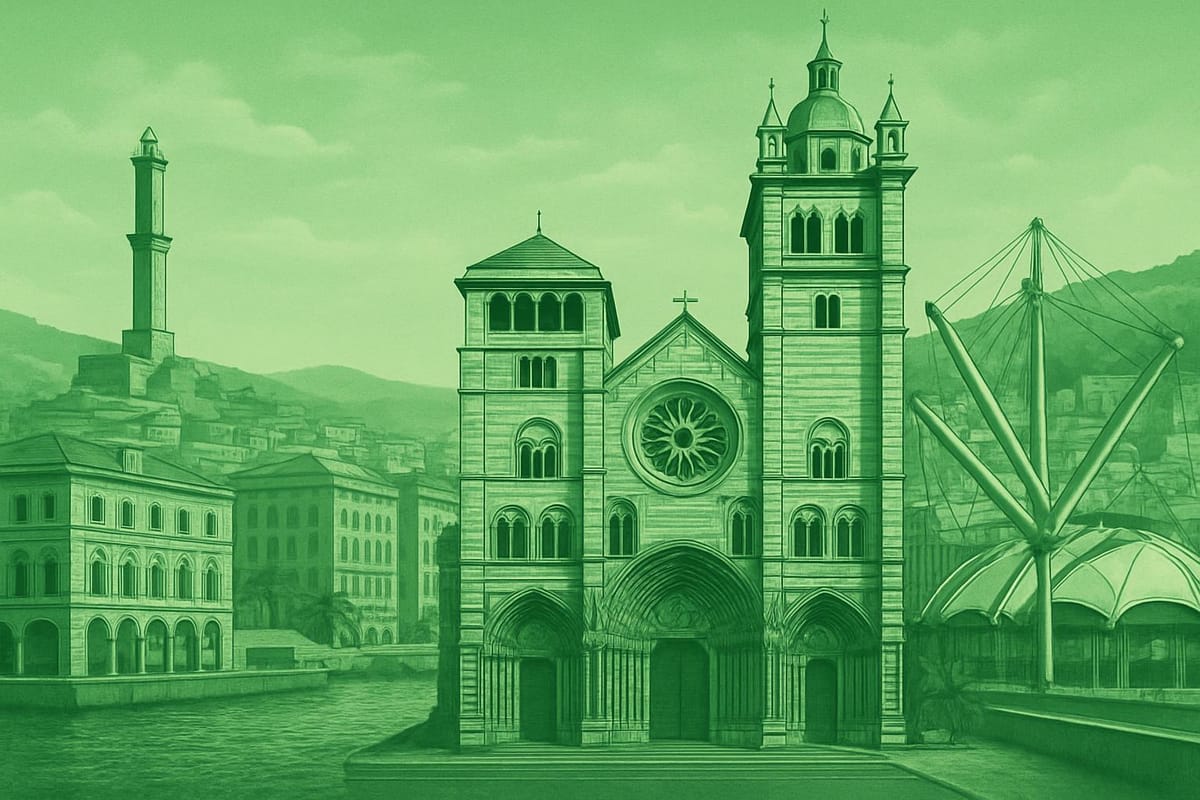Genoa
Historic port: wander medieval alleys, UNESCO palaces, top aquarium, maritime museum & seafood.

Important things to know about Genoa
Genoa, known in Italian as Genova, is a dynamic port city on the Ligurian coast of Italy where a centuries-old maritime tradition meets contemporary urban life, producing a dense mosaic of narrow streets, working quays and residential neighborhoods that shape everyday rhythms rather than touristic itineraries; its identity is grounded in seafaring commerce, shipbuilding and a bustling harbor economy that continues to influence local employment, transportation and cultural production, while the Mediterranean climate fosters outdoor markets, cafes and an ingrained food culture centered on seafood, pesto and regional produce that locals consider essential to communal dining. The city’s social fabric is characterized by neighborhoods with distinct dialects, artisan workshops and small family-run businesses that maintain traditional crafts alongside growing sectors in logistics, research and the creative industries, including design and digital startups connected to nearby universities. Architectural variety - from compact medieval housing to austere maritime warehouses and 19th-century residential boulevards - reflects Genoa’s complex history as a trading republic and industrial port, shaping a public realm where public transport, local commerce and social life intersect around markets, schools and community centers rather than concentrated visitor attractions. Everyday cultural expressions, street festivals, and a resilient sense of local identity support a civic energy that is both cosmopolitan and rooted in regional customs, making Genoa a living example of how an historic Italian city adapts economically and socially to contemporary challenges while preserving the tactile character of its streets, cuisine and maritime legacy.
Sightseeing hot-spots in Genoa
Genoa is a captivating Mediterranean port where history and contemporary life meet along winding streets and sunlit plazas. Sightseeing in Genoa starts naturally in the Old Town, a labyrinth of narrow caruggi that leads to majestic squares like Piazza De Ferrari, home to the city's ornate opera house and bustling fountains. The imposing Cattedrale di San Lorenzo with its striped facade tells centuries of religious and civic history, while the regenerated port area invites visitors to stroll the waterfront, sample Ligurian cuisine and admire the glittering harbor views.
Art and architecture lovers will be drawn to the extraordinary Palazzi dei Rolli, a UNESCO-listed ensemble of aristocratic palaces along Via Garibaldi showcasing Renaissance and Baroque splendor. Museums housed in these palazzi display fine art collections, period furnishings and frescoed salons that reveal Genoa's mercantile golden age. For a contrast of scale and atmosphere, the Lanterna, the ancient lighthouse standing sentinel over the city, offers panoramic vistas and a tangible link to Genoa's maritime power, perfect for photo-worthy moments during golden hour.
No visit to Genoa is complete without experiencing the famed Aquarium of Genoa, one of Europe's largest, where marine life from the Mediterranean and beyond creates unforgettable encounters. Sightseeing in Genoa is best done on foot or by short public transport hops, allowing you to discover hidden artisan shops, taste authentic pesto in family-run trattorie, and take short day trips along the Ligurian coast. Whether you search for historic monuments, seaside charm or cultural treasures, Genoa Italy rewards curious travelers with a rich and varied itinerary that lingers long after you leave.
Hotels to enjoy in Genoa
Genoa is a city of winding alleys, grand palaces and a thriving waterfront, and the variety of hotels in Genoa reflects that rich character. Visitors can choose from elegant boutique properties tucked into the historic center, modern business hotels near the train station, or charming family-run guesthouses overlooking the Porto Antico and the sparkling Ligurian Sea. Many Genoa hotels combine classic architecture with contemporary comforts like free Wi‑Fi, air conditioning and on-site dining, making them ideal for leisure travelers and professionals alike. Whether you’re seeking a luxury stay with panoramic Mediterranean views or a budget-friendly option close to the aquarium and museums, accommodation in Genoa offers convenient access to popular attractions and authentic Ligurian restaurants serving fresh seafood and pesto.
When planning your trip, look for Genoa hotels that emphasize location - proximity to the train station, the waterfront and the main squares can save time and enhance your experience. Business travelers will appreciate properties near conference venues, while families often prioritize family-friendly rooms and easy access to ferries and beaches. To improve your search and booking success, include keywords like hotels in Genoa, Genoa hotels and stay in Genoa in searches, and compare reviews for cleanliness, service and breakfast options. For arrivals by air, consider transfers from Cristoforo Colombo Airport or hotels offering shuttle services. With thoughtful planning, choosing the right hotel in Genoa ensures a comfortable base from which to explore narrow lanes, historic palazzi and the vibrant seafront culture.
Restaurants to try in Genoa
Genoa is a treasure trove for food lovers, where restaurants in Genoa range from humble trattorie tucked into the labyrinthine lanes of the Old Town (Centro Storico) to elegant dining rooms overlooking the Porto Antico. The city's culinary identity is deeply tied to Liguria, and in Genoa you can taste the region in every bite: trofie al pesto, pansoti with walnut sauce, and the ever-present focaccia and focaccia col formaggio that accompany meals or act as delicious street food. Freshness is paramount, so many Genoa restaurants highlight the catch of the day, simple grilled fish, and seafood stews made with herbs and citrus that reflect the nearby Mediterranean. Visiting local osterie and modern bistros you’ll notice a focus on seasonal, sustainable ingredients and a convivial atmosphere where the emphasis is as much on hospitality as on a perfectly executed plate.
For those seeking variety, Genoa offers everything from classic family-run kitchens serving traditional recipes passed down generations to contemporary chefs reinventing Genovese flavors with artistic techniques. Wine bars and enotecas provide excellent regional pairings featuring Ligurian whites and light reds, ideal companions to pesto-rich dishes and shellfish. Whether you're searching for the best restaurants in Genoa for a special occasion, budget-friendly eateries with authentic local fare, or places to sample the city’s famous seafood and pesto, Genoa’s dining scene rewards exploration with genuine flavors, warm service, and a sense of history that flavors every meal.
Best shopping stops in Genoa
Genoa shopping is a delightful fusion of historic charm and contemporary style, with winding alleys and grand boulevards offering something for every taste. Stroll along Via XX Settembre and Galleria Mazzini for a mix of international brands and elegant boutiques, then lose yourself in the maze of the Caruggi, the medieval lanes where tiny artisan shops and independent designers sell handcrafted clothing, silk goods and bespoke accessories. Art lovers will find antique dealers and gallery spaces near Via Garibaldi, while those seeking unique homewares can uncover ceramic treasures and maritime-inspired pieces that echo Genoa’s seafaring past. The city's shopping districts balance the luxury of refined showrooms with the authenticity of family-run bottegas, making shopping in Genoa an experience that blends discovery with indulgence.
For foodies and gift-hunters, the markets deliver some of the best reasons to go shopping in Genoa. The historic Mercato Orientale bursts with fresh produce, olive oil, regional cheeses and jars of aromatic pesto-perfect souvenirs that capture Ligurian flavors. Along the waterfront near Porto Antico, pop-up stalls and craft shops showcase local designers, vintage finds and contemporary crafts; antiques and vintage boutiques scattered through the old town offer rare pieces and conversation starters. Whether you’re searching for the best shopping in Genoa for fashion, gourmet specialties or handmade gifts, the city rewards curious shoppers with a rich blend of local artisanship and stylish retail, ensuring every purchase feels rooted in Genovese culture.
Nightlife highlights in Genoa
Genoa nightlife sparkles around the Porto Antico and the twisting lanes of the Old Town, where evenings blend history and modern fun. As the sun sets, locals and visitors flock to cozy wine bars and lively pubs for the quintessential aperitivo, pairing crisp drinks with slices of warm focaccia. Trendy cocktail bars and rooftop terraces near the seafront offer panoramic views of the harbor while DJs and acoustic sets create a buzzing soundtrack for a night out. Whether you’re hunting for late-night Genoa clubs with pulsing beats or intimate speakeasies serving handcrafted cocktails, the city’s nightlife scene caters to every mood and keeps the energy until the early hours.
Beyond the harbor, the narrow alleys off Via Garibaldi reveal hidden gems where live music-from jazz to indie-fills centuries-old courtyards and converted cellars. Small concert venues and seasonal festivals make Genoa bars natural hubs for culture and conversation, while upscale lounges attract those seeking a sophisticated nightcap. Food remains central to the experience: neighborhood trattorie open late so you can savor Ligurian specialties before or after dancing. With a mix of seaside charm, historic atmosphere and contemporary hotspots, Genoa nightlife promises memorable evenings that highlight the best of this Italian port city.
Getting around in Genoa
Genoa, Italy offers convenient air and rail options for travelers: Genoa Cristoforo Colombo Airport (GOA) sits just west of the historic center and is served by regular shuttle buses, taxis and car rentals that typically reach downtown in about 20–30 minutes depending on traffic, making Genoa airport a practical gateway to Liguria and the Italian Riviera; on the rail side, the city's two main hubs-Genova Piazza Principe for long-distance services and Genova Brignole for regional and eastbound trains-provide frequent high-speed and regional connections to Milan, Turin, Rome and beyond, with smooth interchange options to local buses, metro and tram lines for last-mile access to hotels, the port and attractions; rail travelers will appreciate clear signage, ticket machines and online booking for Trenitalia and regional carriers, while those arriving by plane can choose between economical public transport or faster private transfers to reach the city center, cruise terminals or nearby hillside neighborhoods, so whether your itinerary centers on the port, the historic old town or coastal day trips, the integrated airport and train network in Genoa ensures flexible connections across Italy and the Mediterranean.
Culture must-see's in Genoa
Genoa’s cultural highlights reflect a rich tapestry of maritime history, Renaissance grandeur and vibrant street life that make Genova a compelling destination in Italy. Walking through the Old Port (Porto Antico) you feel the city’s seafaring soul, where the modern Aquarium of Genoa stands beside restored docks and contemporary museums, creating a lively cultural corridor. The narrow lanes of the caruggi reveal artisan shops, traditional osterie and frescoed churches, while museums like the Galata Museo del Mare and the Palazzo Ducale showcase naval artifacts and rotating exhibitions that celebrate Genoa’s role as a Mediterranean power. The architectural ensemble of the Palazzi dei Rolli, with its opulent palaces and UNESCO recognition, together with the elegant Via Garibaldi, offers a concentrated dose of art, history and baroque splendor, perfect for photography, cultural tours and history-focused searches.
Culinary culture in Genoa is as central to its identity as its maritime past, with pesto alla genovese, focaccia and seafood dishes acting as edible expressions of local heritage. Seasonal festivals, classical concerts in restored palazzi and street performances across the historic center keep the city’s cultural calendar full year-round, attracting both casual visitors and scholars of Italian culture. For travelers seeking a blend of museums, historic architecture and authentic Ligurian cuisine, Genoa delivers memorable cultural highlights that are easily combined with coastal day trips and regional explorations, ensuring this Italian port city remains an essential stop on any culturally oriented itinerary.
History of Genoa
Genoa sits on the Ligurian coast as a city whose history reads like a maritime epic: from a modest Roman settlement to the powerful Republic of Genoa, one of the great Maritime Republics of the Mediterranean. By the Middle Ages the city had transformed into a thriving naval and commercial power, its fleet and merchant houses dominating trade routes between the Italian peninsula, the Byzantine world, and the Near East. Genoa’s prosperity was fueled by shipbuilding, banking and the spice and silk trades, and the city became synonymous with seafaring innovation and financial savvy. The medieval walls, the bustling Port of Genoa, and the rise of noble families created a dense urban fabric whose influence reached across the Mediterranean. Key figures like Christopher Columbus, who is linked to Genoa by birth and maritime education, emerged from this environment, while the city’s shipyards and arsenals supplied galleys for both commerce and war. Architectural projects from the Strade Nuove to the ornate palaces reflected not only wealth but civic pride; the Palazzi dei Rolli later became a symbol of Genoa’s golden age and its role in Mediterranean diplomacy and culture.
The modern era of Genoa, Italy shows a city that reinvented itself through waves of industrialization, political change and reconstruction after wartime damage. During the 19th and 20th centuries, Genoa became a leading industrial and maritime hub, its docks and rail links connecting northern Italy to global markets. Despite the struggles of economic shifts and the scars of World War II, the city preserved a remarkable architectural and cultural legacy, recognized today by UNESCO and tourism focused on its historic center, museums and the Aquarium of Genoa. Contemporary Genoa balances port activity with cultural regeneration, promoting its medieval lanes, artistic heritage, and culinary traditions rooted in Ligurian ingredients. The history of Genoa continues to attract historians, travelers and entrepreneurs intrigued by a city that blends ancient maritime networks, Renaissance grandeur and modern port infrastructure-an enduring testament to resilience, innovation and the layered past of a major Mediterranean capital.



